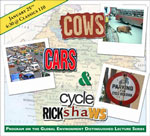How do I see the video/hear the audio? There are two ways to experience the multimedia content on this site:
- Download: Just right-click (or control-click on a Mac) on a link that says "download" and choose "save file as" (or something similar) -- this will save a .mov (Quicktime) or .mp3 file onto your computer. Since these files might be very large, this is only recommended if you have a fast connection and a lot of room on your hard drive.
- In your browser: If you don't want to save the file on your computer, click the "new window" link. The audio or video file should begin playing in a new window. To see video or hear audio in your browser, you'll need the free Quicktime plugin for your browser. We also recommend using a standards-compliant browser such as Firefox to view this site.
What is a podcast? Podcasting is a method of distributing multimedia content over the web. When you use a program called a "podcatcher" to subscribe to a podcast, the podcatcher will periodically check to see if new content (in this case, audio or video files) has been added to the podcast. If new content is available, the podcatcher will automatically download the new file(s) for you, making them available to play on your computer, iPod, or other digital media device.
What do these buttons mean?
![]() will take you to a page that will allow you to subscribe via one of several different podcatchers. You can also right-click (control-click for Mac) and copy the address into the podcatcher of your choice.
will take you to a page that will allow you to subscribe via one of several different podcatchers. You can also right-click (control-click for Mac) and copy the address into the podcatcher of your choice.
![]() will allow you to subscribe to the podcast via the iTunes music store, if that is your preferred podcatcher. It's free to subscribe and download podcasts from iTunes, but you have to have iTunes installed on your computer (download it now).
will allow you to subscribe to the podcast via the iTunes music store, if that is your preferred podcatcher. It's free to subscribe and download podcasts from iTunes, but you have to have iTunes installed on your computer (download it now).
Still confused? The University has posted information about RSS, the technology behind podcasting as well as information about subscribing to RSS feeds. If you want to learn more, you can also read Wikipedia's article on podcasting.
More questions? Please e-mail chiasmos@uchicago.edu.

"Cows, Cars and Cycle-Rickshaws: The Politics of Nature on the Streets of Delhi"
January 25, 2008
A talk by Amita Baviskar, Associate Professor at the Institute of Economic Growth, Delhi University.
As an embodied public sphere, city streets are sites for multiple exchanges between differently located people and things. This talk focuses on cows, cars and cycle-rickshaws as they navigate Delhi's roads, and on the people who own, use and seek to control them. All three have been the subject of strenuous efforts at regulation by courts, citizens' groups and traders' associations. Professor Bavkiskar interprets these conflicts as instances of bourgeois environmentalism, the (mainly) middle-class pursuit of urban order, hygiene and safety, and ecological conservation. She argues that collective action in the "public interest" by "citizens" concerned about congestion and the collapse of civic infrastructure constitutes a public that excludes the city's poorer sections. The talk examines state attempts to regulate the traffic between cars, cows and rickshaws, and concludes by arguing that complex interdependencies avert imminent collision and enable "the republic of the street"" to survive.
From the Program on the Global Environment.
